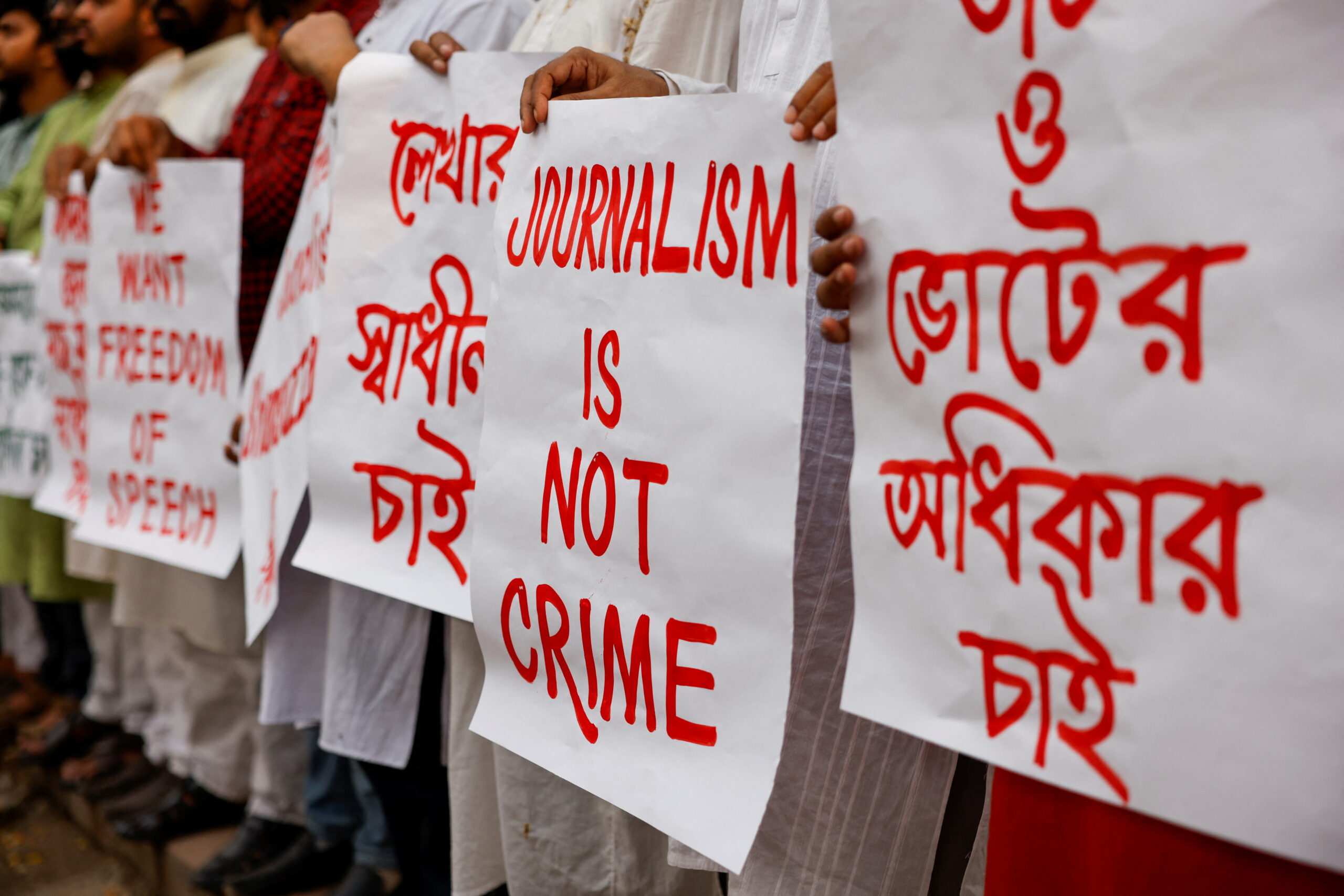A new report by the Clooney Foundation for Justice’s TrialWatch initiative and the Centre for Governance Studies (CGS) examines the chilling impact of Bangladesh’s 2018 Digital Security Act (DSA) on press freedom and identifies lessons for the future, in advance of general elections scheduled for February 2026.
The report analyzes 222 cases involving 396 journalists to document how the DSA was applied to punish reporting and criticism online, including interviews with 30 affected journalists.
The DSA was adopted in 2018 to replace the widely criticized Information and Communication Technology (ICT) Act of 2006, which was the subject of a 2024 TrialWatch report. Yet many of the problematic provisions of the ICT Act carried over into the DSA and its immediate successor, the Cyber Security Act of 2023 (CSA), with little reform.
Our data reveals that authorities used the DSA as a tool of harassment and intimidation, especially politicians (73 of 222 cases) and other powerful figures who used the law to settle personal rivalries. Accused journalists were often arrested arbitrarily, without a warrant, with some facing multiple overlapping cases––as the DSA allowed anyone to allege a violation, whether or not they were the subject of the accused’s reporting. Once in detention, nearly half of the journalists we spoke to said they experienced abuse or mistreatment.
In one case based on reporting on alleged police corruption, the case was triggered not by the police officer implicated in the reporting, but by someone affiliated with the ruling party. The journalist states that he faced aggressive questioning from five to six officers who allegedly used electric shocks against him during the interrogation. He said the questioning revolved around whether he harbored anti-government views.
“Like the law it replaced, the DSA’s broad and vague provisions facilitated the criminalization of reporting and dissent,” said Maneka Khanna, Senior Legal Program Manager at TrialWatch. “The DSA had few safeguards against meritless cases and gave the police nearly unfettered ability to arrest journalists or seize their devices without a warrant.”
Most proceedings under the DSA did not reach trial, though the ones that did ended in acquittal (only one journalist in the dataset was convicted), reflecting the baseless nature of these cases. The process itself inflicted serious personal, financial and professional harm, impacting the journalists and press freedom in general.
While the DSA was repealed in 2023, the risks the report identifies endure. Earlier this year, the interim government adopted the 2025 Cyber Security Ordinance (CSO), which removed or amended many of the provisions that had enabled prosecutions under the DSA and CSA. But the CSO retains vaguely worded provisions—particularly Section 26, which criminalizes publishing content that “is related to any religion or communal hate speech” and “creates anxiety” —that could still be used to suppress speech.
“Independent journalism in Bangladesh has long faced serious obstacles, and the Digital Security Act placed even tighter limits on the ability of journalists to work freely,” said CGS President Zillur Rahman. “A careful review of the DSA’s impact is essential for shaping future safeguards so that no law in Bangladesh can be used again to suppress free speech or restrict the press. Any government that takes office will need to ensure an environment where the media can operate without pressure, and this will also depend on sustained engagement from civil society and the citizens.”
This press release is available in Bengali here.
ABOUT THE CLOONEY FOUNDATION FOR JUSTICE’S TRIALWATCH INITIATIVE
TrialWatch provides free legal aid to journalists who are unfairly imprisoned to secure their release and uphold freedom of speech.
ABOUT THE CLOONEY FOUNDATION FOR JUSTICE
The Clooney Foundation for Justice wages justice by providing free legal aid in defense of free speech and women’s rights in over 40 countries. Its work has led to dozens of journalists being set free and thousands of women receiving free legal support to defend their rights.
ABOUT THE CENTRE FOR GOVERNANCE STUDIES
The Centre for Governance Studies (CGS) is an independent, non-profit think tank and research organization in Bangladesh committed to strengthening governance and supporting democratic development. Through research, policy analysis, and multi-stakeholder engagement, CGS works with government bodies, international partners, civil society, academic institutions, and the private sector to promote informed dialogue and policymaking.
